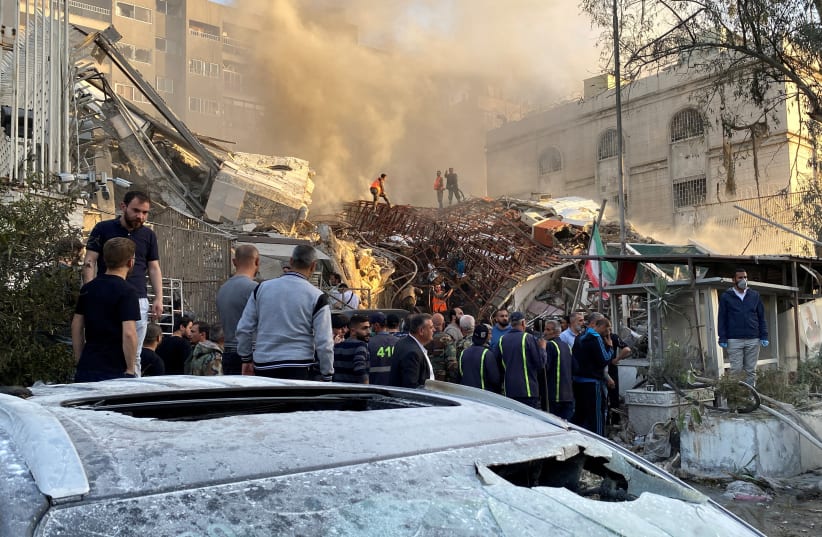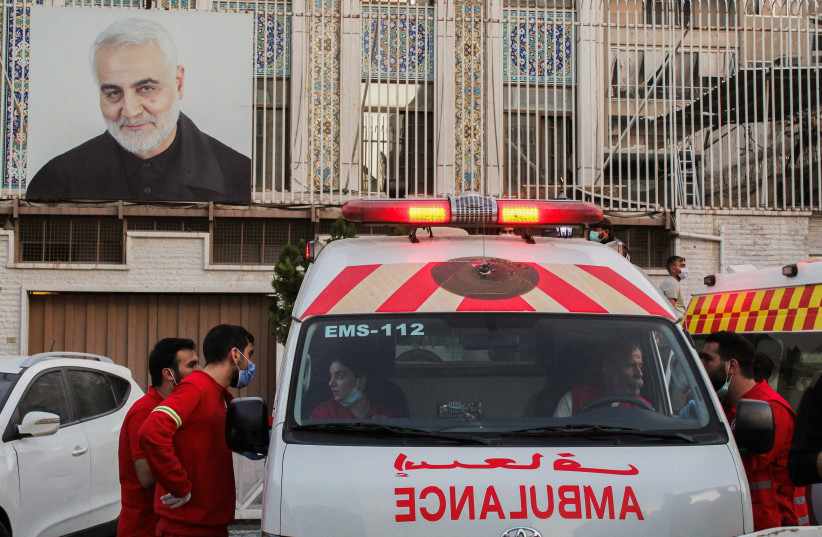An alleged Israeli airstrike on the Iranian consulate building in Damascus Monday night resulted in the killing of a number of Iranian Revolutionary Guard and Quds Force generals.
HUDHAIFA EBRAHIM/THE MEDIA LINE APRIL 3, 2024 00:50
Updated: APRIL 3, 2024 00:59

An alleged Israeli airstrike on the Iranian consulate building in Damascus Monday night resulted in the killing of a number of Iranian Revolutionary Guard and Quds Force generals, and it is considered one of the biggest strikes against these two Iranian organizations after the killing of Qassem Soleimani—the commander of the Iranian Quds Force—in a US airstrike in Baghdad in January 2020.
According to Iranian, Iraqi, and Syrian media loyal to Iran, the highest of these leaders is General Mohammad Reza Zahedi, commander of the Revolutionary Guards in Syria and Lebanon. He is considered the de facto ruler of the Iranian-backed militias in Damascus and Beirut. In addition to Zahedi, among the dead were the Chief of Staff of the Revolutionary Guard, Mohammad Hadi Rahimi, General Hossein Aman Allahi, General Hossein Aman Allahi, Seyyed Mehdi Jaladati, Engineer Mohsen Sadaqat, Ali Agha Babaei, and Seyed Ali Salehi Rouzbahani, according to a statement by the Iranian Revolutionary Guard.
Also, according to what was reported by Lebanese media close to Hezbollah, among the dead were also Muhammad Adnan Sanbour and Mustafa Suleiman, who were leaders in the Lebanese Hezbollah.
The Supreme Leader of Iran, Ali Khamenei, said in a statement published by Iranian news agencies, “The malicious Zionist entity will receive its punishment at the hands of our brave men. We will make the Zionists regret the crime of attacking the Iranian consulate in Damascus and others like it.”

Members of Syrian Red Crescent work near the damaged site after what Syrian and Iranian media described as an Israeli air strike on Iran’s consulate in the Syrian capital Damascus April 1, 2024. (credit: FIRAS MAKDESI/REUTERS)
On Monday evening, the Iranian Supreme Security Council held a meeting in the presence of Iranian President Ebrahim Raisi after the Israeli bombing of the Iranian consulate in Damascus. The Secretariat of the Iranian Supreme National Security Council said, “The Council took the appropriate decisions regarding the war crime related to the Israeli bombing of the Iranian consulate in Damascus,” noting that the Council’s decisions were taken in a session attended by Raisi, which took place on Monday evening.
The success of the strike
Sufyan al-Samarrai, head of the Baghdad Post website, told The Media Line, “This is one of the largest strikes directed against the Iranian Revolutionary Guard, the Quds Force, and Hezbollah.” He continued, “This Israeli military strike was successful, and in its goal, they were involved in major war crimes in Syria and Lebanon, and they were also running an operations room to conspire against Jordan and Saudi Arabia.”
He also said, “We can only applaud this successful strike. All of Iran’s followers and militias must be eliminated so that the region can enjoy security and stability.”
Echoing the sentiment of accountability yet spotlighting the human cost, Syrian journalist Majd Kanaan told The Media Line, “These leaders were involved in the blood of the Syrian and Lebanese people, and they were planning to destroy several countries in the region.”
“The Khomeini regime in Iran is experiencing its worst period. It is in unnatural humiliation and cannot respond, even though Israel is only a few hundred kilometers away from Damascus, and they have large forces stationed in the Syrian capital.”
He added, “The most we will see is bombing some empty American bases in Iraq. This is all they can do.”
Bridging perspectives on the aftermath, Saudi political analyst Enad Al-Shamrani told The Media Line, “Striking the heads of sedition and terrorism is a popular demand. These are not leaders for liberating Jerusalem, but leaders for occupying Arab capitals.”
“General Zahedi was the responsible person in Syria, and we can say that he is the de facto ruler of Syria, but now he has been killed, and we do not know who will come after him.” He added: “The second row of Iranian Revolutionary Guard and Quds Force generals are not as efficient as the leaders of the first row, of whom there are only a few remaining.”
According to Al-Shamrani, “The Gulf countries were not far from targeting the leaders of the Revolutionary Guard, and they are truly criminals.”
Amid discussions of the strike’s strategic ramifications, Ahmed Al-Shibl, a member of Hezbollah in the Iraqi capital, Baghdad, told The Media Line, “So far, there are no orders to respond to Israeli attacks.”
“These martyred leaders were killed because they were defending the truth with our brothers in Gaza. They were fighting the Zionist enemy, and that is why Israel targeted them.”
“The blood of the martyrs will not be shed,” he continued. “We will respond decisively against America, Israel, the evil triangle, and all the traitors and Zionists who help them, and our response will be decisive.”
He added, “We all go in sacrifice for the leaders. These are spiritual leaders before they are field commanders. The resistance does not abandon the blood of its martyrs.”
Intensifying the call for retribution, Hussain Khozam, an Iranian political activist, told The Media Line, “The Islamic resistance will not remain silent regarding these attacks. The response will be decisive against all Israeli interests, just as the response will be decisive from the resistance in Gaza.”
He continued, “These martyrs gave their lives in service of religion and to defend the oppressed in Syria, Lebanon, Palestine, Iraq, and Yemen. The resistance’s response will be decisive.”
In contrast, Mohammad Shazar, a Syrian dissident, told The Media Line, “Iran will not respond. All it will do is a few missiles that its militias will launch toward American bases in Iraq, and perhaps Saudi Arabia or even Jordan.”
Omar Banbih, an Iranian affairs specialist, told The Media Line, “The strike was painful for the Iranians. It is a fact that stopped many of its plans in Jordan, Syria, Palestine, Lebanon, and even the Gulf states.”
He continued, “Israel may have wanted to divert attention from its recent bombing of medical complexes in Gaza, and that is why it killed Iranian leaders who did not participate directly in the war in Gaza but rather committed other crimes in the Arab world.”
Content retrieved from: https://www.jpost.com/arab-israeli-conflict/islamic-resistance-will-not-remain-silent-retaliation-vowed-after-damascus-strike-795051#795051.